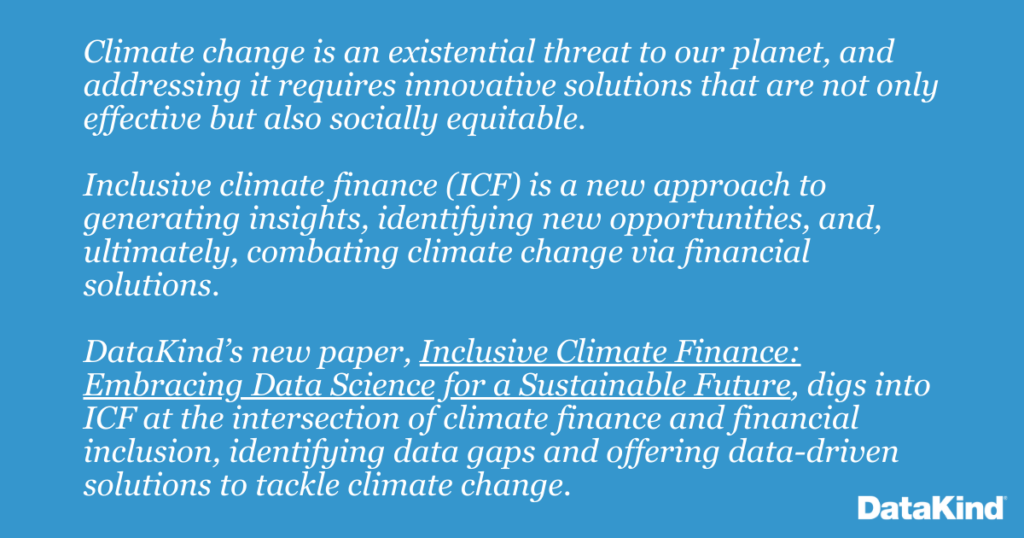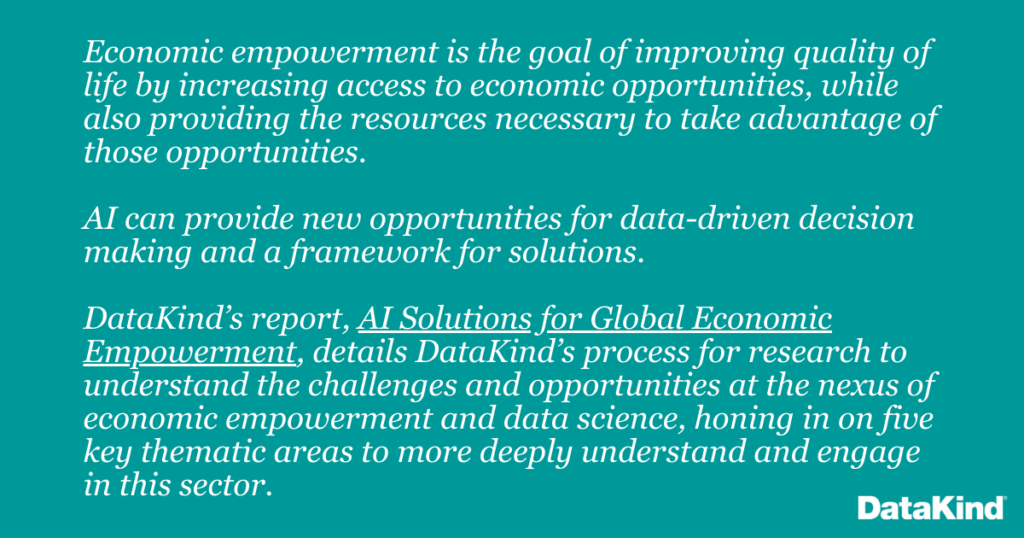With support from the Mastercard Center for Inclusive Growth, DataKind is advancing work in economic opportunity with a focus on financial inclusion.
Worldwide, approximately 1.7 billion people are excluded from the formal economy. This includes people who are unbanked or who lack sufficient credit history to take advantage of financial services. While the unbanked are disproportionately in the global south, this is far from a global south issue. In the US, nearly one in five adults are so called “credit invisible”, meaning they don’t have enough credit history to access loans.
Financial inclusion is a critical step in reducing poverty and supporting the financial growth of individuals, families, and communities. Access to credit, savings, and insurance that are appropriate for individual needs are the stepping stones to financial inclusivity, financial health, and overall resilience.
Yet, despite progress made in recent years, challenges still need to be addressed to achieve universal financial inclusion. Some of the main obstacles include:
- Lack of infrastructure
- Limited financial literacy
- Regulatory and legal barriers
- Limited access to technology
- High costs
- Lack of trust
Addressing these challenges requires a comprehensive approach that includes the development of infrastructure, education and awareness programs, regulatory reforms, and efforts to increase access to technology and reduce costs.
DataKind is delighted to announce that new support from the Mastercard Center for Inclusive Growth (CFIG) will accelerate the development of DataKind’s most impactful data science and AI solutions in financial inclusion. Drawing on DataKind’s extensive work in this field, CFIG’s latest funding provides a unique opportunity for DataKind to leverage expertise in data science and AI to increase access and use of financial services.
Using data science and AI to impact financial inclusion
Financial inclusion is a pivotal determinant of individuals’ livelihoods, empowering them with the means to effectively manage their finances, seize economic opportunities, and mitigate risks. However, as stated above, a substantial portion of the global population remains excluded from formal financial services, limiting their potential for upward mobility and economic security.
Digital technologies are a transformative force in this context, extending the boundaries of financial inclusion by overcoming traditional barriers. Through mobile applications, online platforms, and digital banking solutions, these technologies facilitate easier access to banking, payment, credit, and insurance services, even in remote and underserved regions. By enhancing accessibility, affordability, and convenience, digital innovations extend the benefits of financial inclusion to the marginalized, fostering economic empowerment and driving broader socioeconomic progress.
For data science and AI, the most impactful solutions in this field leverage the rapid uptake of digitization, especially in the wake of COVID-19. Digital-first approaches provide wider geographic reach, penetrating previously untapped regions to reach those individuals at the last mile. Digitization can also lower costs (for both business and individuals), and increase speed, transparency, and security of more tailored financial services to serve the un- or under-banked at scale.
Looking ahead
Advances in technology and data analytics have created new opportunities to expand access to financial service and reduce costs. DataKind is thrilled to leverage this new frontier to expand the impact, reach, and scale of partner organizations working to create more efficient and effective financial systems that can reach more people and provide better services.
In the coming weeks, we’ll share more about our work in financial inclusion as we uncover pain points across organizations with our Discovery Days, highlight how we dive into research and find opportunities to drive innovation forward with our Landscapes (check out the one below!), and do a deep dive into how we execute on impact for our partners and the field at large through our cohort of DataCorps projects.

Climate change is an existential threat to our planet, and addressing it requires innovative solutions that are not only effective but also socially equitable. Inclusive climate finance (ICF) is a new approach to generating insights, identifying new opportunities, and, ultimately, combating climate change via financial solutions. DataKind’s new paper, Inclusive Climate Finance: Embracing Data Science for a Sustainable Future, digs into ICF at the intersection of climate finance and financial inclusion, identifying data gaps and offering data-driven solutions to tackle climate change.

Economic empowerment is the goal of improving quality of life by increasing access to economic opportunities, while also providing the resources necessary to take advantage of those opportunities. AI can provide new opportunities for data-driven decision making and a framework for solutions. DataKind’s report, AI Solutions for Global Economic Empowerment, details DataKind’s process for research to understand the challenges and opportunities at the nexus of economic empowerment and data science, honing in on five key thematic areas to more deeply understand and engage in this sector.



